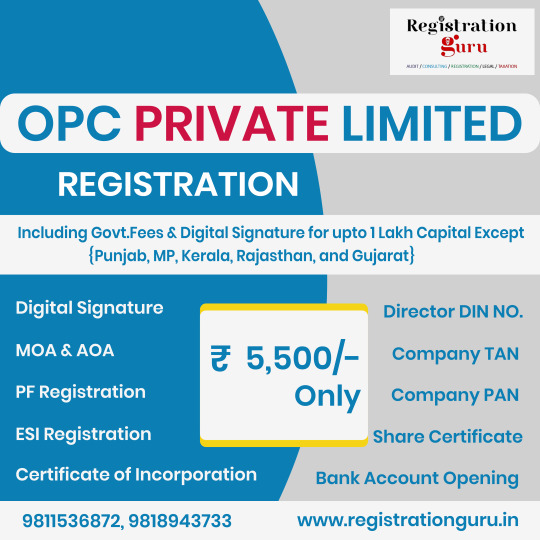#opc registration
Text
5 Reasons to Register a Company

Welcome to Vyaapar Seva Kendra, your trusted partner for all your business registration and compliance needs. In today's blog, we will explore the compelling reasons why registering a company is a smart decision for aspiring entrepreneurs and businesses of all sizes.
1. Legal Recognition and Protection
One of the foremost reasons to register a company is the legal recognition and protection it offers. When you register your company, it becomes a separate legal entity, distinct from its owners. This separation provides a shield that protects your personal assets from the company's liabilities. In other words, your personal assets, such as your home and savings, are not at risk if the company faces financial troubles.
2. Credibility and Trust
A registered company carries a higher level of credibility and trust in the eyes of customers, partners, and investors. It signifies a commitment to professionalism and adherence to legal standards. Many clients and businesses prefer to work with registered companies, enhancing your business opportunities and partnerships.
3. Access to Funding
If you plan to raise capital through investors or secure loans from financial institutions, registering your company is often a prerequisite. Investors and lenders are more likely to support a registered company as it signifies a higher level of commitment and accountability.
4. Brand Building and Intellectual Property Protection
Registering your company name not only establishes your brand but also provides protection against others using a similar name. This safeguards your brand identity and prevents potential confusion in the market. Additionally, registering trademarks and patents becomes easier for a registered company, further protecting your intellectual property.
5. Tax Benefits and Incentives
Depending on your country and business structure, registering a company can offer significant tax advantages. It allows you to take advantage of tax deductions, credits, and incentives that may not be available to sole proprietors or partnerships. Properly structured, your company can help you optimize your tax liabilities and improve your bottom line.
Conclusion
Registering a company is a strategic move that can provide a range of benefits, from legal protection to financial advantages. It enhances your business's credibility, opens doors to funding opportunities, and offers protection for your brand and intellectual property. Additionally, it can lead to substantial tax benefits, helping your business thrive.
At Vyaapar Seva Kendra, we understand the importance of company registration and are here to guide you through the process. Our expert team can assist you in navigating the complexities of registration, ensuring that your business enjoys all the advantages of legal recognition.
Don't miss out on the opportunities that come with registering your company. Visit our website here to learn more about our services and start your journey towards a successful and legally recognized business entity today. Register your company, and unlock the doors to growth and success!
2 notes
·
View notes
Text

Register your company as a One Person Company (OPC) through Registration Guru.
For more information
Call us:- 9811536872
Visit us:- https://registrationguru.in/one-person-company-registration
Email us:- [email protected]
1 note
·
View note
Text
A Beginner's Guide to OPC Registration

Are you ready to turn your entrepreneurial dream into reality as a solo founder? Registering a One Person Company (OPC) could be the perfect starting point for your business journey. OPCs provide a strong foundation for aspiring entrepreneurs by offering the advantages of limited liability and a separate legal identity. If you're new to OPC registration, fear not! This guide will walk you through the process step by step, making sure about a smooth and successful registration experience.
Process of OPC Registration Online
Understanding OPC: Before diving into the deep ocean of registration process, it's essential to understand the concept of OPCs. Unlike sole proprietorships, OPCs offer limited liability protection, that means that your personal assets are separate from your business liabilities. This structure provides credibility and security, which is essential for establishing trust with clients and partners.
Selecting a Unique Name: First of all, for OPC registration you have to select a unique name for your company. Make sure that your chosen name complies with naming guidelines and isn't already in use by another entity. Once you've decided a name for your company, reserve it via Ministry of Corporate Affairs (MCA) portal.
Obtaining Digital Signature and DIN: After that, you have to acquire a Digital Signature Certificate (DSC) and Director Identification Number (DIN), which are mandatory for OPC directors. These can be obtained online through the MCA portal by submitting all the necessary documents.
Document Preparation: Then, you should have to gather all the required documents, including address proof, identity proof, and proof of registered office, for OPC registration. Make sure that all documents are accurate and up to date to avoid any delays in the registration process.
Filing for OPC Registration: Once you have all the necessary documents in order, you can file for OPC registration via MCA portal. Submit all the required documents and pay the registration fee, then wait for verification.
Upon successful verification, you'll receive the Certificate of Incorporation, officially establishing your OPC. Congratulations! You're now ready to start your entrepreneurial journey confidently with OPC Registration Online, along with the benefits of limited liability and a solid legal foundation. Remember to fulfill all the ongoing compliance requirements and prepare your OPC for long-term success.
#Company Registration#Online Company Registration#Online Company Registration in India#Company Registration in India#One Person Company#OPC#OPC Registration#OPC Registration Online#OPC Registration Online in India
0 notes
Text
What is OPC? An One Person Company is a type of company established by a single individual, who acts as both the shareholder and the director. Eazybahi Solutions guide you.
One Person Company (OPC) was introduced to encourage entrepreneurs who are capable of starting a venture on their own but are deterred by the requirement of having at least two members, as mandated for a private limited company. OPC, as the name suggests, allows a single individual to establish and run a company, thereby providing a distinct legal identity and limited liability protection. Governed by the Companies Act, 2013, OPCs offer a simplified framework for solo entrepreneurs to operate within the corporate structure.
0 notes
Text
GST Registration for One Person Company: know all about it

GST registration for One Person Company is necessary where numerous organizations have registered and switched over to it. The GST number is a unique identifier that is issued upon the enrolment of any business organization. It is a 15-digit number that is exclusively given to every taxpayer who has registered for the GST.
To collect taxes on behalf of the government and claim an Input Tax Credit for taxes paid on incoming supply, an individual must enroll in the GST Law and get a uniqueGST number from the relevant and opt tax body.
View More Information about GST Registration of One Person Company
0 notes
Text
Why OPC Company Registration is the Best Choice for Solo Entrepreneurs in India

What is OPC Company Registration?
As a solo entrepreneur in India, you may be wondering what the best choice for registering your company is. One option that stands out is OPC (One Person Company) registration. OPC company registration in India is a legal structure that allows a single individual to operate as a separate legal entity. This means that as a solo entrepreneur, you can enjoy the benefits of limited liability and legal recognition that come with a registered company. OPC registration provides a unique opportunity for solo entrepreneurs to establish a business entity that is separate from themselves, offering credibility and protection.
Advantages of OPC Company Registration in India
There are several advantages to opting for OPC company registration as a solo entrepreneur in India. First and foremost, limited liability is a key benefit. By registering your company as an OPC, you are protecting your assets from any liabilities that may arise from your business operations. This means that your assets, such as your house or savings, will not be at risk in case of any financial or legal issues faced by your company.
Another advantage of OPC company registration is that it provides a separate legal entity status to your business. This means that your company will have its own legal identity, distinct from your identity. This legal recognition helps in gaining trust and credibility in the market, making it easier to attract clients, investors, and business partners. Additionally, OPC registration allows you to avail yourself of various tax benefits and incentives offered by the government of India, such as exemptions on capital gains and simplified compliance requirements.
Requirements for OPC Company Registration in India
To register your OPC company in India, you need to fulfill certain requirements. Firstly, the company must have only one shareholder and one director. This means that as a solo entrepreneur, you can be the sole shareholder and director of your OPC. Secondly, the company's name must end with "Private Limited." Thirdly, you need to have a registered office address in India where all official correspondence will be sent.
Furthermore, it is important to note that only a natural person who is an Indian citizen and resident in India for at least 182 days in the previous calendar year can form an OPC. Also, an individual can only incorporate one OPC at a time. These requirements ensure the integrity and authenticity of OPC registration in India.
A step-by-step process for OPC Company Registration
The process of OPC company registration in India involves several steps. This is a step-by-step tutorial to assist you in easily completing the registration process:
Obtain a Digital Signature Certificate (DSC): A DSC is required for online filing of documents. A DSC is available from accredited organizations.
Obtain a Director Identification Number (DIN): The next step is to apply for a DIN, which is a unique identification number for directors. This can be done online through the Ministry of Corporate Affairs (MCA) portal.
Name Approval: Choose a unique and suitable name for your OPC and apply for name approval through the MCA portal. The name ought to adhere to the MCA's naming requirements.
Drafting and Filing Documents: Prepare the necessary documents, such as the Memorandum of Association (MOA) and Articles of Association (AOA), and file them with the Registrar of Companies (ROC) along with the required fees.
Payment of Fees: Pay the prescribed fees for OPC registration through the MCA portal.
Certificate of Incorporation: Once all the documents are verified and fees are paid, the ROC will issue a Certificate of Incorporation, which signifies the official registration of your OPC.
Documents Required for OPC Company Registration
To register an OPC in India, you need to submit certain documents along with the application. Here is a list of the essential documents required for OPC company registration:
Identity proof of the director/shareholder: This can be a PAN card, Aadhaar card, or passport.
Address proof of the director/shareholder: This can be a recent utility bill, bank statement, or passport.
Passport-sized photographs of the director/shareholder.
Proof of registered office address: This can be a rent agreement, lease agreement, or ownership proof of the premises.
Signed and notarized copies of the Memorandum of Association (MOA) and Articles of Association (AOA).
Consent to act as a director and file the declaration of compliance.
Any other documents as required by the ROC during the registration process.
Ensuring the accuracy, completeness, and proper attestation of all documents is crucial to prevent any potential delays or rejections during the registration process.
Benefits of Choosing OPC Company Registration for Solo Entrepreneurs
Opting for OPC company registration as a solo entrepreneur in India can offer numerous benefits. One of the key benefits is limited liability protection, which ensures that your assets are safeguarded in case of any financial or legal issues faced by your company. This gives you comfort and lets you concentrate on expanding your company without worrying about losing your assets.
Another benefit is the legal recognition and credibility that comes with OPC registration. Being a registered company gives your business a professional image, making it easier to attract clients, investors, and business partners. It also allows you to enter into contracts and agreements on behalf of your company, enhancing your business opportunities.
Additionally, OPC registration provides tax benefits and incentives offered by the government of India. As an OPC, you can avail exemptions on capital gains, simplified compliance requirements, and various tax deductions. This can result in significant cost savings and improved profitability for your business.
Comparison between OPC and other types of company registration in India
When considering company registration options in India, it is important to compare OPC with other types of company registration to make an informed decision. While OPC is suitable for solo entrepreneurs, other types of company registrations, such as Private Limited Company and Limited Liability Partnership (LLP), may be more suitable for businesses with multiple partners or shareholders.
A Private Limited Company offers the advantage of limited liability protection and separate legal entity status, similar to an OPC. However, it requires a minimum of two shareholders and two directors, which may not be feasible for solo entrepreneurs. On the other hand, an LLP is suitable for businesses where partners want to have limited liability protection, but also want flexibility in terms of management and decision-making.
Choosing the right type of company registration depends on your specific business needs, future growth plans, and the number of individuals involved in the business. It is recommended to consult with a professional OPC registration consultant to understand the nuances and make an informed decision.
Choosing a reliable OPC Registration Consultant
As the process of OPC company registration in India involves legal and technical complexities, it is advisable to seek the assistance of a reliable OPC registration consultant. An OPC registration consultant can help you navigate the registration process smoothly and ensure compliance with all legal requirements. They can assist you with document preparation, name approval, filing of documents, and other formalities.
When choosing an OPC registration consultant, consider their experience, reputation, and track record. Look for consultants who have a deep understanding of the OPC registration process and are well-versed in the legal framework. It is also important to clarify the fees upfront to avoid any surprises later.
Common mistakes to avoid during OPC Company Registration
While registering an OPC in India, it is crucial to avoid common mistakes that can lead to delays or rejections. Here are some common mistakes to avoid during the OPC company registration process:
Choosing an inappropriate name: Ensure that the name you choose for your OPC complies with the naming guidelines specified by the MCA. Avoid using names that are similar to existing companies or trademarks.
Incomplete or inaccurate documents: Double-check all the documents to ensure accuracy and completeness. Erroneous or absent information may cause delays or rejections.
Non-compliance with legal requirements: Stay updated with the latest legal requirements and ensure compliance at every stage of the registration process. Failure to comply with legal requirements can result in penalties or rejection of your application.
Lack of professional guidance: Seeking professional guidance from an OPC registration consultant is essential to avoid mistakes and ensure a smooth registration process.
By being aware of these common mistakes and taking necessary precautions, you can streamline the OPC company registration process and avoid unnecessary complications.
Conclusion: Why OPC Company Registration is the Best Choice for Solo Entrepreneurs in India
In conclusion, OPC company registration is the best choice for solo entrepreneurs in India due to its numerous benefits and advantages. By registering your company as an OPC, you can enjoy limited liability protection, separate legal entity status, tax benefits, and credibility in the market. OPC registration provides a unique opportunity for solo entrepreneurs to establish themselves as separate legal entities, gaining trust and recognition in the business world.
To ensure a smooth and hassle-free registration process, it is advisable to seek the assistance of a reliable OPC registration consultant. They can guide you through the process, help with document preparation, and ensure compliance with all legal requirements.
If you are a solo entrepreneur in India, and looking to establish your business with limited liability and legal recognition, OPC company registration is the ideal choice. Make the right move today and register your OPC to unlock the benefits and opportunities that come with it.
To Know More About OPC Company Registration Read Out Our Other Blog Also
#one person company#opc#opc registration#company#registration#company registration#one person company registration#opc company#Company formation#company filling
0 notes
Text
Step-by-Step Guide for OPC Registration in India
If you are looking for a business structure with the advantages of both company and sole proprietorship, OPC (One Person Company) is the best option. OPC registration in India is a unique business structure that permits a single person to function as a company. The promoter of the company works as a director and shareholder of the company.
What is a One-Person Company in India?
OPC registration in India was introduced as a concept under the Companies Act of 2013, which helps individuals establish a company with the benefits of sole proprietorship and a traditional company structure. The idea of forming an OPC occurred when the Companies Act was implemented in 2013. The main reason behind promoting OPC registration in India is to boost entrepreneurship and encourage the formation of micro, small, and medium industries.
OPC Registration in India
In India, registering an OPC (One Person Company) has been streamlined by introducing the SPICe+ (Simplified Proforma for Incorporating Company Electronically Plus) form. This electronic form has replaced the previous paper-based application forms for company incorporation, making the process more efficient and convenient for aspiring entrepreneurs.
The process for an OPC registration consists of two steps:
Part 1: The beginning of the SPICe+ form includes obtaining approval for the company name and applying the proposed director's Direct Identification Number(DIN) and Permanent Account Number(PAN).
Part 2: Part 2 involves providing incorporation-related details such as the registered office address of the OPC, details about share capital, and information about the shareholder is provided.
Here are the steps involved in the OPC registration in India:
Obtain DSC (Digital Signature Certificate): Obtaining a digital signature certificate for the proposed director for electronically signed documents is crucial.
Obtain DIN (Direct Identification Number): Take the Director Identification Number (DIN) from the Ministry of Corporation Affairs (MCA).
Name Reservation: Submit a name reservation application via the MCA portal using Form SPICe+ (Part A). Verify that the selected name for your company is unique and does not resemble existing company names or trademarks.
Prepare MOA and AOA: Draft the company's MOA (Memorandum of Association) and AOA (Article of Association). Both are crucial documents that outline the objectives and internal rules of the company.
File the Forms: File necessary forms with MCA and attach the required documents such as MOA, AOA, declarations, proof of the registered office, nominee appointment, and other documents with the SPICe+ form as required by the MCA.
Certificate of Incorporation: Upon the due approval by the ROC and compliance with the given requirements, the ROC will issue a Certificate of Inclusion, which tells the successful registration of your OPC. It is essential to point out that PAN (Permanent Account Number) and TAN (Tax Deduction and Collection Account Number) are automatically generated during the registration process, thus eliminating the need to apply for PAN or TAN numbers separately.
0 notes
Text

0 notes
Text
What is One Person Company? A Comprehensive Guide
One Person Compnay
The Companies Act, 2013 revolutionized the corporate laws in India by with the introduction of new concepts. The introduction of the concept of “What is One Person Company” began a whole new way of starting businesses which granted flexibility that a company could offer. It also has protected limited liability which was lacking in partnerships and sole proprietorships.
Want to know more about What is One Person Company?

#opc #one person company #one person company registration #opc registration
1 note
·
View note
Text
Unleashing Business Solo: Features of One Person Company
A One Person Company is run by only one person. According to Section 2 (62) of the Companies Act, 2013, One Person Company is a company that consists of only one person as a member. It is incorporated and maintained by a single person.
A One Person Company (OPC) can only be registered as a Private Limited Company and provisions applicable to a private company will also prevail for it. It is easy to convert a One Person Company into a Private Limited Company or a Public Company. The word “One Person Company” must obligatorily be mentioned at the end of the company’s name.
This blog explains how incorporating an OPC offers a great number of advantages over other company types.
Characteristics of One Person Company
A One Person Company has the following features;
It can be incorporated into a private company.
Only one member and a director are allowed.
In the name of the company, under brackets, the term One Person Company should be included.
Only a natural person, Indian citizen, or a person residing in India can be the member/nominee.
A minor cannot become nominee, shareholder, etc. of the company.
Read more features of OPC here:
https://blogs.24efiling.com/features-of-one-person-company
#one person company#one person company registration#opc#opc registration#features of one person company registartion
1 note
·
View note
Text
One Person Company Registration

0 notes
Text
Unlocking the 4 Concept of One Person Company
Earlier, it was mandatory to have minimum of two person to form a company, after the introduction of the Companies’ Act 2013, included a concept of one Person Company in the section 2(62). According to section 2(62), it provides that one person company can be formed by one member not more than one member. There are several advantages of one Person Company such as easy funding, limited liability, single owner etc.
This blog provides a deep and clear view about the one person company.
WHO IS ELIGIBLE FOR REGISTERING ONE PERSON COMPANY?
A natural citizen who is a resident of India can form OPC.
There must be only one person in OPC.
The name which has been created by a particular OPC should be unique and it should not be similar to any other company and trademark which is already in existence.
A person cannot have and operate more than one OPC.
Along with the member, there must be one director to run the business of OPC.
PROCESS OF REGISTERING ONE PERSON COMPANY
Step 1 – Firstly, to start the OPC, one should apply for the DSC (Digital Signature Certificate) of the proposed director.
Step 2 – Followed by the first step, the Member of the OPC must apply for the DIN (Director Identification Number) of the proposed director.
Step 3 – Next, it should be opted and kept ready for name approval. The Members of OPC must apply for the name reservation of the company in MCA (Ministry of Corporate Affairs). They should apply with one name in the SPICe+ (INC-32) application form.
Step 4 – after getting approval the member of OPC has to accumulate or submit all the essential documents and should attach all these documents to the SPICe Form, SPICe-AOA, SPICe-MOA and upload it to the MCA site for approval.
Step 5 - After completing the verification of the documents, which all submitted, the ROC (Registers of Company) will provide or issue an Incorporation Certificate which will enable the member of the OPC to start and run the company.
ADVANTAGES OF ONE PERSON COMPANY:
1. A Separate legal entity
The first and foremost advantage of OPC is that an OPC is a separate legal entity and has the capacity to function the same as how an entrepreneur works. If spoken legally, a company is a person, which has a common seal, and perpetual succession. It has the authority to exercise all the functions of an incorporated person.
2. Easy Funding
OPC is a private company, it can raise funds through many ways like financial institutions, venture capital, angel investors, etc. when it is seen that OPC is able to raise funds then it is gradually building itself into a private company.
3. Limited liability
One of the great advantage of OPC is that it has a lot of opportunities where it can grab to perform with limited liability. It means that an individual can take up risk without suffering or affecting the loss of his personal assets.
4. Minimum Requirements:
Here are some basic requirements to have an OPC:
1 Shareholder
1 Director
1 Nominee
There must be a name formed by the OPC to distinguish it from other companies. It should be unique and not similar to any existing company’s name or trademark
6. Benefits of being a Small Scale Industries (SSI)
An OPC receives various benefits which are provided to Small Scale Industries like the easy funding from the bank without depositing any security, low interest rates on the loan, etc. All these benefits can help and be a great advantage to any business in its infancy.
7. Single Owner
In OPC, the single owner in OPC is responsible for quick decision-making, controlling and managing the business of his own company. The owner of the OPC has the complete power to run the business.
8. Credit rating
The OPC should definitely have a good credit rating. If the OPC has a good credit rating, then it has a good impression and can easily get a loan. If not, it is quite hard to operate the business.
9. Benefits under Income Tax Law
OPC enjoys certain benefits under income tax law .Unlike proprietorship, any remuneration that is paid to the director will be considered as the deduction as per income tax law and also presumptive taxation is available under the income tax law.
10. Receive interest on any late Payment:
This benefit for OPC is available under Enterprises Development Act, 2006. According to this Act, if the buyer or receiver receives any late payment even after a specified period, then he can receive interest which is three times the bank rate. This is a great advantage for the OPC to develop its business.
11. Increased Trust and prestige
The OPC which has good business with good profit also has a good reputation among the people. No doubt, it increases its prestige and trust over the people. Not only OPC, any business entity which runs in the form of the company enjoys an increased trust and prestige,
Want to know more; Visit 24efiling
#Concept of One Person Company#One Person Company#One Person Company Registration#OPC#opc registration
1 note
·
View note
Text

Certainly, here's information about the registration process for a One Person Company (OPC) in India:
One Person Company (OPC) Registration in India
A One Person Company (OPC) is a legal structure that allows a single individual to own and manage a business as a separate legal entity. It provides limited liability protection while maintaining the simplicity of a sole proprietorship. Here's a step-by-step guide to registering an OPC in India:
Step 1: Choose a Name for Your OPC
Choose a unique and meaningful name for your OPC. Ensure the name complies with the naming guidelines provided by the Ministry of Corporate Affairs (MCA). You can check the name's availability on the MCA website.
Step 2: Obtain Director Identification Number (DIN)
The sole member of the OPC needs to obtain a Director Identification Number (DIN). This can be done by filing Form DIR-3 online with the MCA.
Step 3: Obtain Digital Signature Certificate (DSC)
Since the registration process is online, you need to obtain a Digital Signature Certificate (DSC) for the sole member. The DSC is required for digitally signing documents during the registration process.
Step 4: Prepare and File the Incorporation Documents
File the required documents with the Registrar of Companies (ROC) to incorporate your OPC. The key documents include:
Memorandum of Association (MoA): This document outlines the company's main objectives and business activities.
Articles of Association (AoA): This document defines the internal rules and regulations governing the company's operations.
Consent to Act as Director and Declaration: The sole member needs to provide their consent to act as a director of the OPC and make a declaration of compliance with the Companies Act.
Step 5: Payment of Fees and Stamp Duty
Pay the necessary fees and stamp duty as per the prescribed rates. The fee amount varies based on the authorized capital of the OPC.
Step 6: Certificate of Incorporation
Once the ROC reviews and approves the documents, you will receive the Certificate of Incorporation. This document officially establishes your OPC as a separate legal entity.
Step 7: PAN and TAN Application
Apply for a Permanent Account Number (PAN) and Tax Deduction and Collection Account Number (TAN) for your OPC. These are essential for tax-related purposes.
Step 8: Compliance Requirements
After incorporation, ensure you comply with annual filing and other statutory requirements, such as filing financial statements and annual returns.

Benefits of OPC Registration:
Limited Liability: The member's liability is limited to the extent of their investment in the company.
Separate Legal Entity: The OPC has its own legal identity, distinct from the owner.
Single Ownership: A single person can form and manage the company.
Ease of Transfer: Shares can be transferred to another person, ensuring business continuity.
Enhanced Credibility: An OPC enjoys greater credibility among suppliers, customers, and lenders.
Conclusion:
Registering a One Person Company in India is a streamlined process that offers the advantages of limited liability and separate legal identity while being managed by a single individual. It's recommended to seek professional assistance to navigate the legal requirements and ensure a smooth registration process.
#one person company registration in chennai#one person company registration#opc registration#opc registration in chennai#one person company registration in india#kanakkupillai#chennaifilings
0 notes
Photo

(via A Complete Guide For Beginner On OPC Registration)
#Company Registration#Online Company Registration#OPC Registration#One Person Company Registration#Company Registration in India#OPC Registration in India
0 notes
Text
Unlock Your Entrepreneurial Journey with Ease! We Provide Hassle-Free One Person Company Registration Services to Empower Solo Entrepreneurs.
1 note
·
View note
Text
Unveiling the LLP as Startup Advantages and Disadvantages

LLP as Startup advantages and disadvantages is an interesting topic to understand and this blog focus on this topic. A startup has an opportunity, it can either incorporate into a Private Limited Company or Limited Liability Partnership (LLP).
There are also other two options for the incorporation
(1)One Person Company (OPC)
(2) Sole Proprietorship
These two options are mostly excluded, the reason is that they are not that good in attracting the investment of the company and also in Sole Proprietorship, the proprietor enjoys the most personal unlimited liability which is not highly appreciable.

LLP is one of the options for the startups to get incorporated under it, as it will provide various advantages to the startups like flexibility and limited liability in the partnership firm. One of the most important things to be kept in mind is that LLP can enter into a contract by itself and it can hold or purchase the property of its own which is highly beneficial.
The LLP has a great advantage in that it can continue its existence irrespective of the changes in partners. The Limited Liability Partnership is a separate legal entity, where it is liable to the full extent of its assets but the liability of the partners of that particular firm is limited to their agreed contribution towards the Limited Liability Partnership.

View More About LLP as Startup Advantages and Disadvantages
0 notes